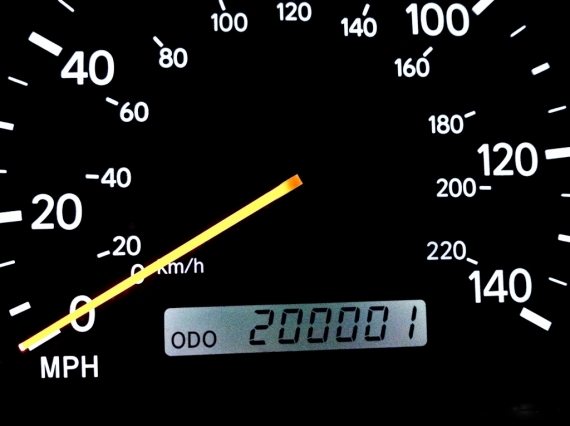Engine checks to carry out at 200,000 km
You have a car that is almost clocking 200,000km. You do regular servicing and it is in good condition. What engine checks should you carry out at 200,000km? To begin with, bear in mind that each car model has slightly different recommended maintenance intervals and tasks.
However, you need to carry out the following service tasks at 200,000 kilometres or 120,000miles.
By carrying out regular service you will have replaced the engine air filter, engine coolant, engine oil and filter, spark plugs and rotated tyres.
In addition, for instance, if you have a Toyota, you should renew automatic gearbox oil with recommended Toyota TIV ATF, replace the long life fuel filter and clean the strainer at the fuel pump.
You need to inspect the brake system: brake pads, brake linings and drums, brake fluid colour, brake lines or hoses, brake master and slave cylinders for leaks.
Check the steering linkages (tie rods), ball joints, steering column joints for loose play, steering gearbox, drive shaft gaiters for leaking grease. Suspension arm bushes, link bars, shock absorbers and mountings. Differential oil and seals. Exhaust pipe and silencer.
Oil filler cap seal, radiator cap seal, fuel filler cap seal. Radiator and expansion bottle, coolant hoses. Check electricals: lights, switches for convenient features and accessories, wipers, window washers, windows. Check door locks and hinges.
It is important to use genuine engine service parts for your respective car model and good multigrade engine oil because your engine valve train is very delicate and requires engine oil which travels up the engine promptly (prompt oil pressure build up).
Choice of fuel with detergency (cleaning additives) is useful because it keeps the engine intake valves free of accumulated harmful deposits. This ensures engine protection, good performance and fuel economy.
It is important to use genuine engine service parts for your respective car model and good multigrade engine oil because your engine valve train is very delicate and requires engine oil which travels up the engine promptly (prompt oil pressure build up).
Choice of fuel with detergency (cleaning additives) is useful because it keeps the engine intake valves free of accumulated harmful deposits. This ensures engine protection, good performance and fuel economy.
Engine checks to carry out at 200,000 km
Additional tips to get your car past the 200,000km mark:
Engine checks to carry out at 200,000 km – Avoid short trips.
The difference between driving short distances and longer distances – and it’s a detrimental one to your vehicle – is that the engine never has a chance to reach its optimal operating temperature on short trips. Here’s why that’s a problem. Water is a byproduct of combustion. When the engine is nice and hot and operating at its most efficient temperature, the water turns to vapor and is ventilated out of the engine. But on short trips, the engine never gets up to that optimal temperature, and as a result, that water can remain in the engine, collect in the oil, and settle in the exhaust system where it causes excessive wear and tear. Frequent short trips also mean an increased number of cold starts for the engine, which also translates to increased wear because the engine’s oil isn’t flowing as freely or in every place that it should until the engine is warmed up.
Engine checks to carry out at 200,000 km – Find a mechanic you trust and like.
Given the choice, you’d rather work with someone you get along with, who you believe has your best interests at heart, right? That’s why you need a good technician who’s going to be a partner in your quest to reach that magical 200,000 milestone, not someone interested only in selling you an expensive repair and never seeing you again. If they’re experienced, accustomed to working on the type of vehicle you drive, and convenient to your work or home, it could be the start of a beautiful relationship.
Engine checks to carry out at 200,000 km : Read your owner’s manual.
In addition to informing you what that little button on the dash is actually for, the owner’s manual contains vital information about the various vehicle components that need to be monitored and replaced, when that needs to happen, and how owners can perform the checks. Following the owner’s manual also helps prolong your vehicle’s life because it specifies what types of fluids work best in the vehicle and provides vehicle operation instructions that prevent damage and reduce wear.
Follow the recommended vehicle maintenance schedule.
If you hate your vehicle and don’t want it to last through the next block let alone make it to 200,000 miles, then this is the one category you want to ignore. Nothing shortens a vehicle’s life faster than a lack of maintenance. Remember your friendly mechanic and the stimulating reading found between the pages of your owner’s manual? They’re both instrumental in knowing when to perform routine vehicle maintenance, based on either mileage or time increments, or both.
While you should keep up on all maintenance items, the most important is far and away the oil change. In addition to lubricating vital engine parts, oil traps contaminants and prevents them from harming your engine. Changing the oil gets rid of all that trapped gnarly stuff. Oil also breaks down over time, so it’s necessary to replace it at regular intervals.

